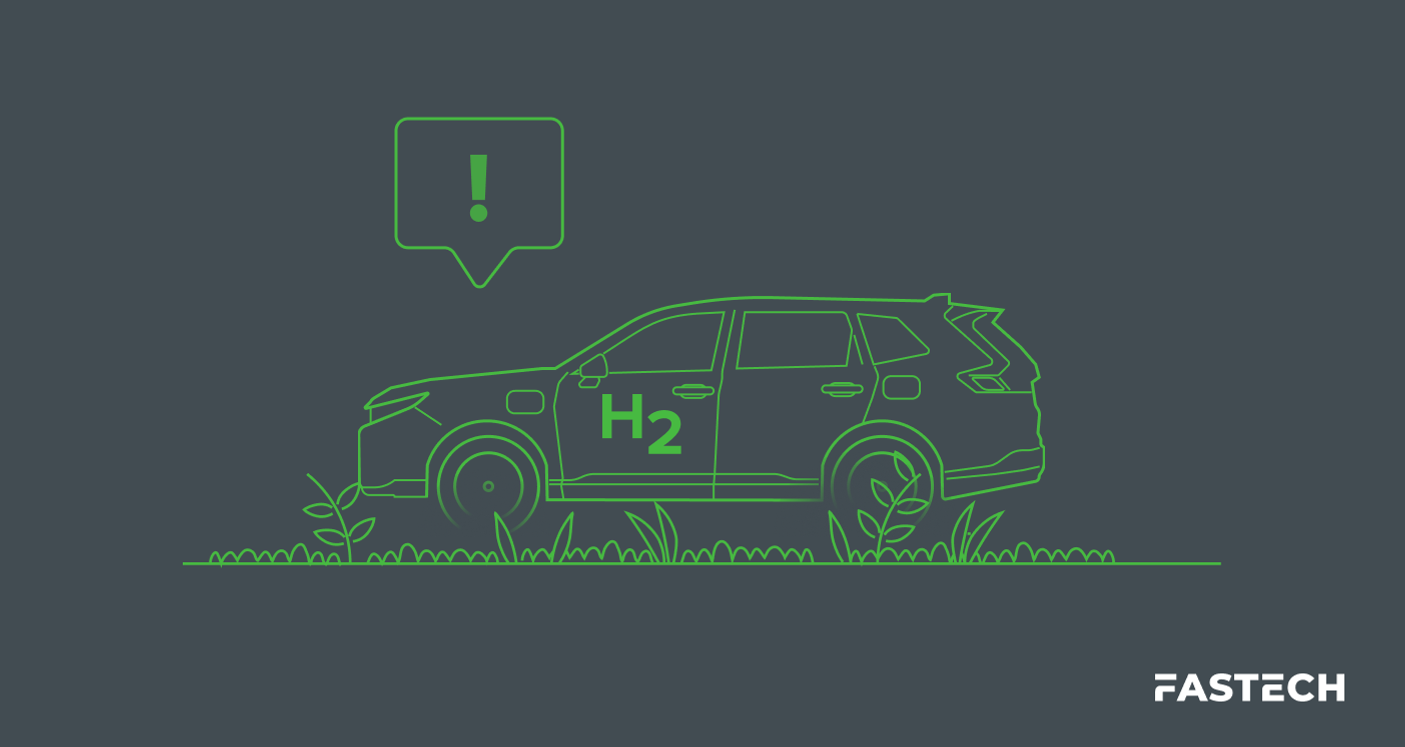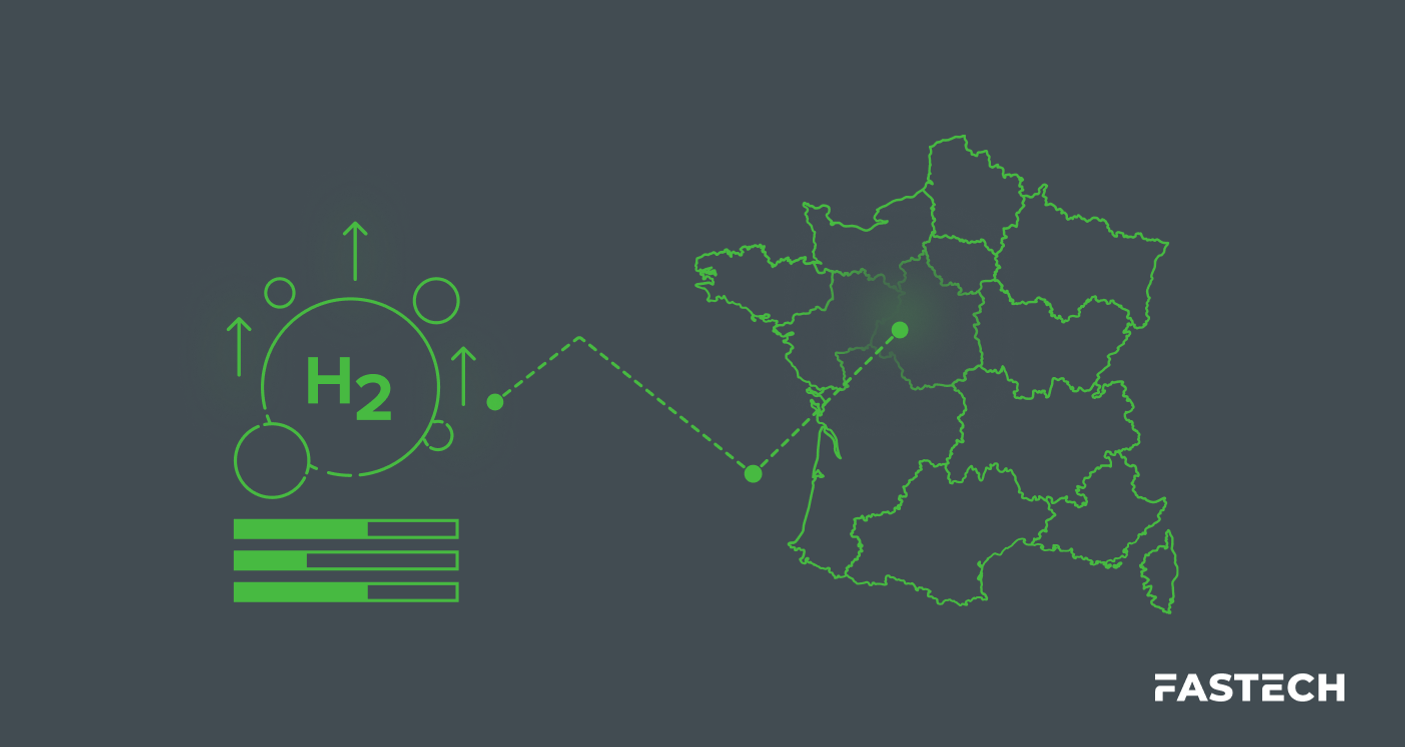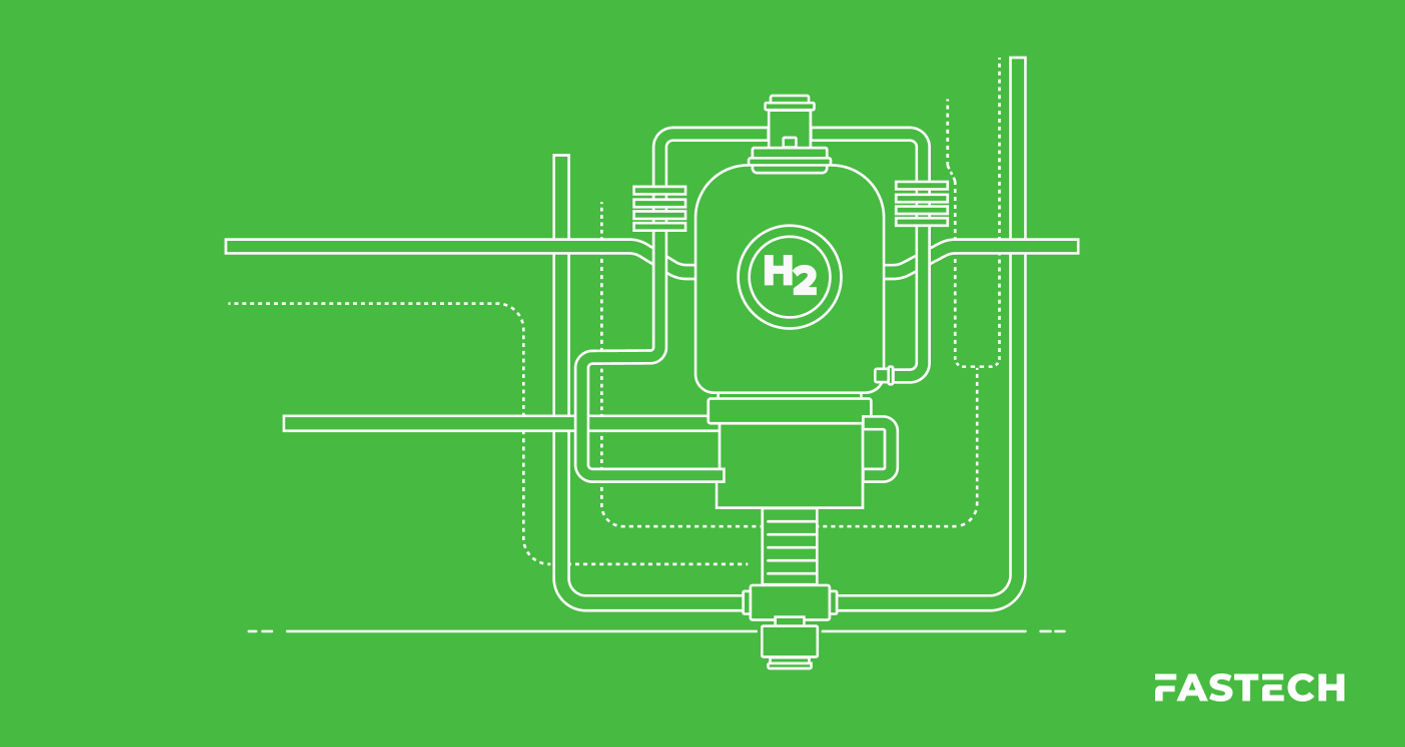8 Vehicle Manufacturers Working on Hydrogen Fuel Cell Cars

The idea of a hydrogen-powered car is nothing new. More than 200 years ago, the first internal combustion engine ran on oxygen and molecular hydrogen (H2).
But the latest models of hydrogen cars are different. Hydrogen fuel cell electric vehicles (FCEVs) are ultra-efficient, converting pure hydrogen gas into electricity with nearly zero tailpipe emissions besides water vapor.
This carbon emission-free technology has caught the attention of some of the auto industry’s biggest players, especially given significant recent growth in the global hydrogen economy.
As hydrogen infrastructure continues its growth, so, too, does its financial feasibility. FASTECH is among the sector’s leading developers expanding the nation’s H2 storage, transport, and dispensing capabilities.
In this article, we’ll look at companies hedging their bets on a hydrogen car future and driving sustainable mobility forward.
Toyota's Hydrogen Cars, Trucks, and More
Toyota has been a leader in fuel cell vehicle development since 1992, pioneering hydrogen technology long before many competitors.
In January 2025, Toyota announced its EU partnership and plans to help roll out hydrogen fuel corridors across the Trans-European Transport Network (TEN-T). The automaker’s contribution isn’t vehicles, but its “Twin Mid Flow Technology,” capable of light- and heavy-duty fueling from the same dispenser.
Toyota Hilux
In 2023, Toyota introduced a hydrogen fuel cell version of its Hilux pickup. This prototype uses core components from the Mirai, such as its fuel cell and hydrogen tanks, and achieves a range of nearly 400 miles. The Hilux prototype is currently undergoing testing, with small-scale production anticipated in the coming years.
Toyota Mirai
The Toyota Mirai, introduced in 2014, remains a cornerstone of Toyota’s hydrogen efforts. Now in its second generation, the 2025 Mirai features an enhanced driving range of up to 400 miles, improved aerodynamics, and advanced safety features. The Mirai gained early traction in markets like California and Europe, but has since experienced a decline in most markets outside Japan.
Check out our Servco Hawaii case study featuring the Toyota Mirai.
Toyota’s Commercial FCEVs
Beyond passenger vehicles, Toyota has expanded its hydrogen focus to commercial applications. The company is testing heavy-duty hydrogen trucks and buses, with prototypes currently being trialed in Europe and Japan.
In 2023, Toyota and PACCAR expanded their collaboration to develop zero-emission, hydrogen fuel cell trucks. This builds on a pilot program at the Port of Los Angeles that helped enhance the trucks' performance and range.
These commercial ventures are part of Toyota's broader goal to accelerate the transition to zero-emission transport, particularly in freight and public transit.
BMW's Hydrogen Car Breakthrough
BMW hadn’t traditionally shown much interest in hydrogen until 2024, when its iX5 Hydrogen pilot fleet was tested globally.
After years of development, this hydrogen-powered SUV integrates BMW's advanced fuel cell technology, offering a maximum output of 401 horsepower and a range of up to 500 kilometers. The vehicle features two hydrogen tanks, which can be refueled in just 3-4 minutes, making it a viable alternative for long-distance, zero-emission driving.
The iX5 Hydrogen is being evaluated under various real-world conditions, including extreme temperatures and different terrains, and has performed impressively in both hot and cold environments. BMW is using insights from this pilot to prepare for potential series production by 2028.
Hyundai's Hydrogen Car Headstart
Hyundai has been a leader in hydrogen fuel cell vehicles since introducing the Nexo in 2018, the world’s first hydrogen-powered SUV. As of 2025, the automaker has continued to maintain its hydrogen mobility market dominance.
The 2024 Nexo has a reported 500-mile range and is set to offer upgrades, including enhanced safety features and an improved interior, which incorporates elements from the Ioniq 5.
Additionally, the new model promises greater efficiency thanks to the second-generation hydrogen fuel cell stack, though a third-generation stack is still in development.
Hyundai N Vision 74
The Hyundai N Vision 74 is a nostalgic hydrogen hybrid concept that pays homage to the 1974 Pony Coupe Concept. The hybrid powertrain combines a lithium-ion battery and hydrogen fuel cell, delivering impressive acceleration. It's a futuristic marvel that will turn heads and attract buyers.
- Driving range: 372 miles
- 670 horsepower (combined)
- 800-Volt fast charging in just five minutes
- Maximum speed: 155 mph
Hyundai’s Commercial FCEV
Hyundai’s XCIENT Fuel Cell truck, first introduced in 2020, continues to transform the heavy-duty vehicle market. It boasts a range of over 250 miles and is already making waves in Europe, especially in Switzerland. Hyundai is also ramping up production, aiming to mass-produce 100,000 fuel cells annually by 2025, with plans to increase the availability of its hydrogen trucks across more markets.
Honda's Hydrogen Car Ambitions
Honda is no stranger to hydrogen fuel cell vehicles, having publicly committed to making battery electric and fuel cell vehicles represent 100% of its sales by 2040.
Between 2017 and 2021, the Japanese motor company sold a hydrogen-powered version of its Clarity model before discontinuing it due to lackluster sales.
That said, Honda is now making a stronger push with hydrogen technology as part of its broader electrification strategy. In 2025, Honda launched the CR-V e, a plug-in hybrid fuel cell vehicle, marking the first time a hydrogen-powered CR-V hit the U.S. market.
This model is unique in that it combines a hydrogen fuel cell system with plug-in hybrid capabilities, allowing drivers to switch between short electric trips and long-range hydrogen-powered travel.
Here’s what sets the new CR-V e apart:
- Plug-in and hydrogen power: The CR-V e is the first North American vehicle to incorporate both plug-in EV charging and hydrogen fuel cell technology. This allows drivers to charge the vehicle for short trips at home while relying on hydrogen for longer journeys, bypassing the limitations of current hydrogen refueling infrastructure.
- Familiar look: The hydrogen-powered CR-V closely resembles the standard CR-V model, highlighting the overall minor changes needed to accommodate modern fuel cell systems.
- Domestic production: Honda produces the CR-V e at its Performance Manufacturing Center in Marysville, Ohio. This marks a key part of Honda’s push to lead in the U.S. hydrogen vehicle market, with plans to expand production in the coming years.
Doubling down on its hydrogen investments, Honda also revealed mass-production plans for its “Next Generation Fuel Cell Module” starting in 2027.
Want to learn more about alternative fuels? Read Understanding Hydrogen, CNG, LNG, RNG, and Propane
Emerging Hydrogen Car Manufacturers
Riversimple Rasa
Riversimple’s Rasa is a concept car that can travel 300 miles with just 1.5 kg of hydrogen, surpassing the average hydrogen car range. It accelerates from 0 to 60 mph in 9.7 seconds and features a unique ultracapacitor system for improved energy storage.
Riversimple is gradually moving toward broader production, with plans to scale up as the hydrogen infrastructure improves. Even King Charles III of the UK test-drove it! The Rasa presents an exciting and practical solution for hydrogen-powered personal transportation.
Land Rover Defender FCEV
Jaguar Land Rover aims for zero tailpipe emissions by 2036. This initiative focuses on creating a hydrogen fuel cell vehicle based on the Land Rover Defender SUV.
While specific range and power details are undisclosed, the vehicle features electric drive units, a fuel cell stack, a large battery for energy recuperation, and a high-pressure hydrogen tank. The Land Rover Defender FCEV's public availability timeline remains to be determined, but its potential is promising.
NamX HUV
The NamX HUV, a hydrogen concept car from Pininfarina, aims to revolutionize driving. It features a permanent H2 tank and a removable setup of six capsules, which could greatly boost the adoption of hydrogen vehicles. NamX plans to offer home capsule delivery and establish new hydrogen capsule refueling stations to address refueling concerns.
Hyperion XP-1
Hyperion Motors, an American manufacturer based in Columbus, Ohio, created a remarkable hydrogen-powered car called the Hyperion XP-1. This hypercar made headlines upon its unveiling in August 2020.
It boasts advanced technology, featuring a cutting-edge hydrogen powerhouse engine module with storage technology derived from NASA. The Hyperion XP-1 offers an astonishing range of over 1,000 miles and produces a staggering total power output of over 2,000 horsepower.
FASTECH: Powering Hydrogen Cars With Reliable Infrastructure
In our collective quest to eliminate harmful carbon emissions, hydrogen-powered vehicles represent an exciting opportunity. These pioneering automotive companies see the potential of alternative fuel. As these FCEVs gain traction with motorists, more hydrogen car makers will likely follow suit.
However, hydrogen fuel cell vehicles are nothing without the fuel that powers them. Drivers need access to a hydrogen infrastructure network as developed as that for fossil fuels.
For all its potential, hydrogen requires dedicated production, distribution, storage, and dispensing equipment to reach greater availability and accessibility in the U.S. That’s where the second part of this transition away from gasoline comes in: Hydrogen infrastructure.
To date, FASTECH has brought over 35 hydrogen refueling stations online, and we’re always adding more.
From consulting and compliance to construction and maintenance, we’re involved in every aspect of the world’s transition to hydrogen. Contact us to find out more about our end-to-end hydrogen solutions.




